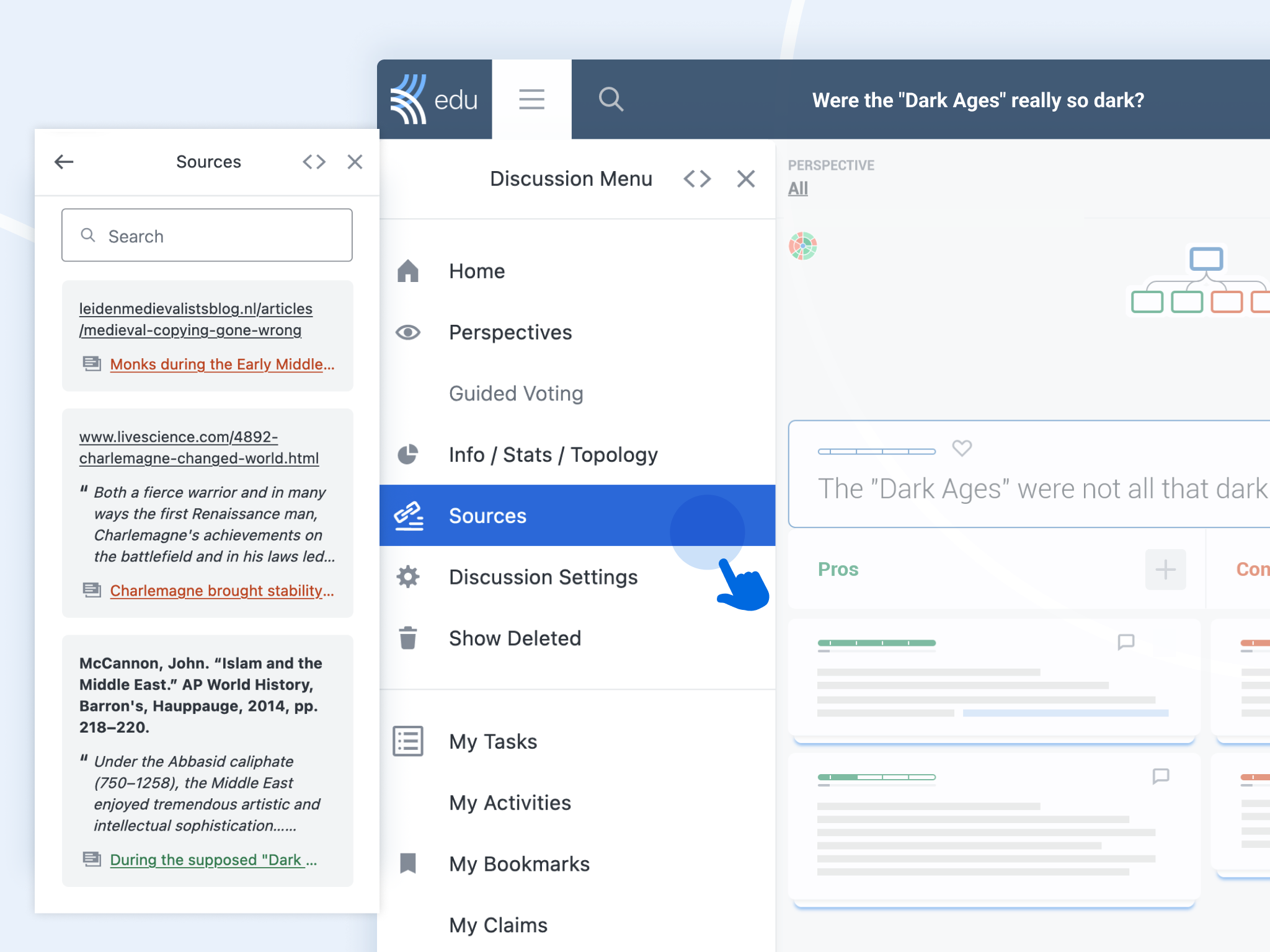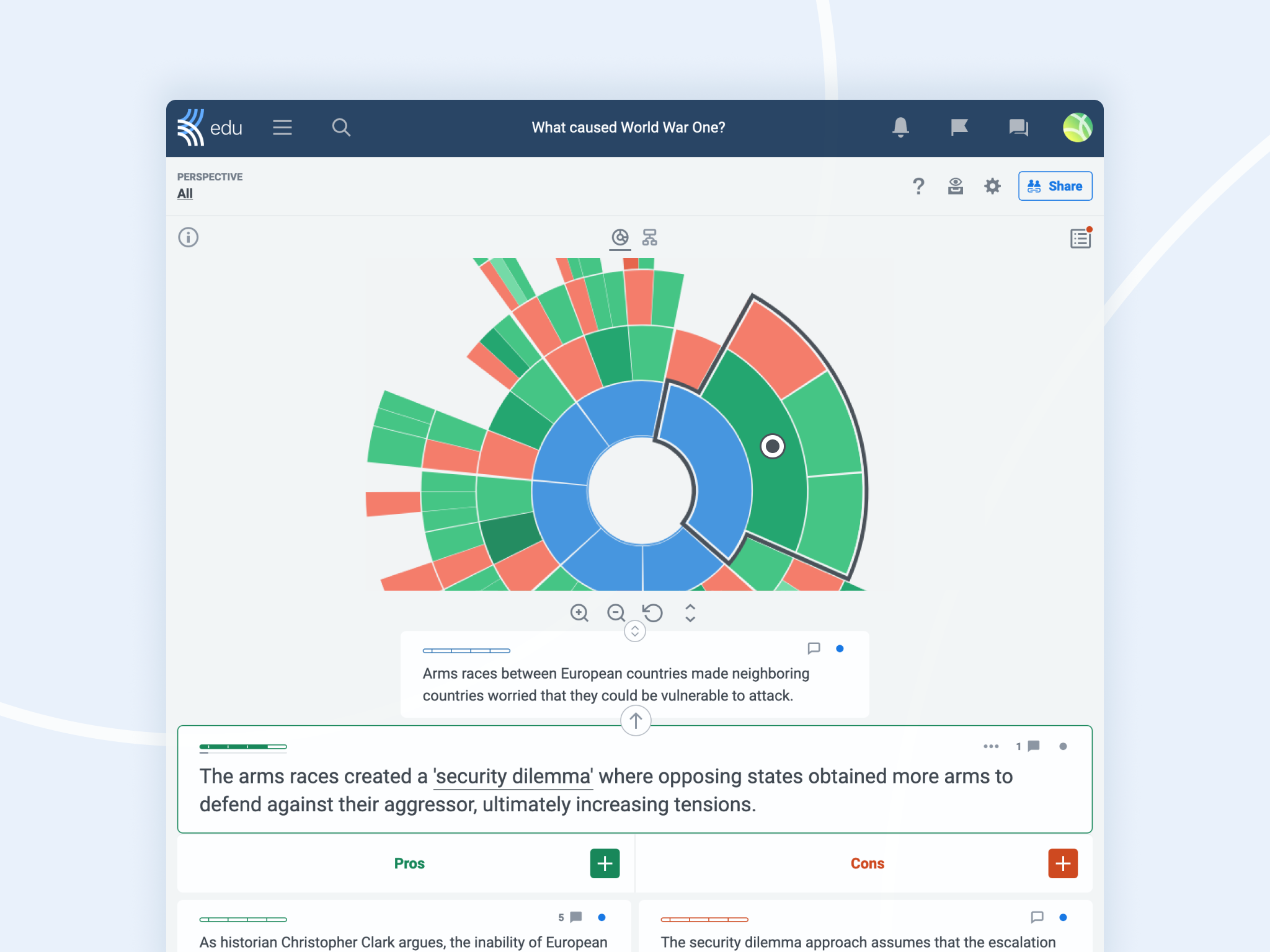As the demand for critical thinkers increases, educators must prioritize developing students’ critical thinking skills. And, as critical thinking is a transferable skill, you can incorporate these critical thinking questions throughout the curriculum and across subjects!
At Kialo, we’re committed to helping you nurture critical thinking in your students through engaging written discussions. Try these questions with your students to build their critical thinking skills through discussion!
What is critical thinking?
Critical thinking is the skill of clear, rational thought. Critical thinkers go beyond accepting information at face value; they interpret and analyze information to form their own evidence-based conclusions.
They also approach questions from multiple perspectives, actively seek out opposing viewpoints, and challenge their own assumptions.
Why do students need to learn critical thinking?
Critical thinking enables students to articulate their perspective, make informed decisions, and solve problems effectively, thereby supporting their civic engagement.
Moreover, in the digital age, students can leverage critical thinking to question biases and assumptions and employ evidence-based reasoning to combat mis- and disinformation. Ultimately, mastering critical thinking equips students to succeed personally, academically, and professionally.
By using critical thinking questions throughout lessons, you can help students build a toolkit of critical thinking skills that they can apply to tackle complex issues now and in the future.
Critical thinking questions to evaluate evidence
In today’s information-rich world, students must learn to critically evaluate the evidence they use to support their viewpoints and make informed decisions. Applying these questions in a Kialo discussion will guide students to select the strongest sources to support their claims.
- How strong is the evidence supporting your argument?
- Are there any counterexamples?
- Are there opposing viewpoints that challenge your evidence?
- How have you ensured the accuracy of your evidence?
- How does this evidence relate to the argument?
- What are the limitations of this evidence?
- Can you summarize the main evidence used to support your argument?
- How do experts in this field view your evidence?
- What might the consequences be if this evidence is flawed?
- Are the inferences being made from the data legitimate?
- Why was this methodology used?
- Was an appropriate-sized sample used?

Critical thinking questions to challenge assumptions
Using critical thinking questions to challenge assumptions teaches students to critically examine their beliefs and thought processes. This helps them identify biases and gaps in their reasoning. Kialo’s “sunburst” mini-map can help support students in visualizing the overall discussion to check that they have presented a balanced overview.

- Can you describe the assumptions you are making?
- Why do you believe this is a valid assumption?
- What if this assumption is incorrect?
- Can you make an alternative assumption?
- What evidence supports your assumption?
- What would happen if we questioned this assumption?
- How does this assumption influence your argument?
- Are there any biases influencing your assumption?
- What is the basis for your assumption?
- What are the biases or assumptions behind the information?
- How have biases or assumptions affected the framing of the problem?
Critical thinking questions to analyze perspectives
- Can you explain any alternative perspectives on this issue?
- How might someone with a different background interpret this?
- How strong are the opposing arguments?
- How might culture influence perspectives on this topic?
- How would a skeptic respond to your argument?
- How might different groups of people view this issue?
- How does historical context influence this perspective?
- How might personal experiences have shaped this perspective?
- What are the implications of accepting this perspective?
Critical thinking questions to assess the validity of arguments
Kialo discussions display arguments visually in a branching framework, so students can easily assess the validity of pros and cons and improve their own arguments. Students can even use Voting and comments to evaluate claims!
- How did you select the evidence to evaluate this argument?
- How can you assess the reliability of this evidence?
- What are the strengths and weaknesses of this argument?
- How does this argument compare to others on the same issue?
- How might biases affect the evaluation of this issue?
- What benchmarks can we use to assess this claim?
- Is the reasoning logical and coherent?
- How well does this argument address counterarguments?
- Should we accept this position?
- How can you assess the value of this argument?
- Why is argument A better than argument B?
Critical thinking questions to explore consequences
- What if we had unlimited resources to solve this problem?
- How could we avoid this problem in the future?
- What if we approached the problem from a different angle?
- How would the outcome differ if we changed one variable?
- What might be the consequences or outcomes of this?
- How might this affect other outcomes?
- How might different stakeholders be affected?
- What are the long-term implications of this?
- What are the associated risks?
- Might there be any unintended consequences?
- How might this impact future developments?
- What would happen if this solution were implemented?
- How would you adapt this to create a different outcome?
Critical thinking questions to examine synthesis
- How do these ideas connect to our learning?
- How do these ideas connect to each other?
- Can you combine these viewpoints into a new perspective?
- Can you identify patterns among the different arguments?
- How can we integrate this new information into our understanding?
- What new conclusions can we draw from this evidence?
- How can we incorporate multiple perspectives in our solution?
- What is the overarching theme in these arguments?
- How might these ideas collectively influence future research?
- How do these findings relate to other research studies?
Critical thinking questions to prompt reflection
Using critical thinking questions for reflection not only gives students deeper insights into their own learning, but also fosters the development of key social-emotional learning skills like self-awareness, decision-making, and resilience.
- What did you learn from this?
- How has your perspective changed as a result of this evidence?
- What obstacles did you encounter while developing your argument?
- How do your personal beliefs influence your analysis?
- Can we identify any unanswered questions?
- How would you apply what you’ve learned to this situation?
- What insights have you gained about your own thinking?
- How do your personal experiences shape your understanding?
Use these critical thinking questions throughout your lessons to arm students with critical thinking skills for future success! Start by heading over to Kialo Edu’s Topic Library, where you’ll find hundreds of ready-made discussion prompts searchable by age and curriculum subject to maximize participation and build students’ critical thinking abilities.
We’d love to add your ideas to our inspiring list of critical thinking questions. Contact us at feedback@kialo-edu.com or on social media.

